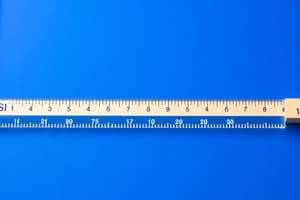Podcast
Questions and Answers
Why do scientists use a standard measurement system?
Why do scientists use a standard measurement system?
Using SI as the standard system of measurement allows scientists to compare data and communicate with each other about their results.
What are the SI units of measure for length, mass, volume, density, time, and temperature?
What are the SI units of measure for length, mass, volume, density, time, and temperature?
Length: meter (m), Mass: kilogram (kg), Volume: liter (L), Density: grams per cubic centimeter (g/cm³) and grams per milliliter (g/mL), Time: stopwatch, Temperature: kelvin (K).
How are conversion factors useful?
How are conversion factors useful?
Conversion factors help in changing measurements from one system to another, like from Celsius to Kelvin.
What is the metric system?
What is the metric system?
What does SI stand for?
What does SI stand for?
What is mass?
What is mass?
What is weight?
What is weight?
What is volume?
What is volume?
What is a meniscus?
What is a meniscus?
What is density?
What is density?
Flashcards are hidden until you start studying
Study Notes
Standard Measurement System
- Scientists use the International System of Units (SI) for consistency in data comparison and communication.
- The standard measurement fosters clarity in scientific research across different regions and disciplines.
SI Units of Measurement
- Length: Meter (m) is the basic SI unit.
- Mass: Kilogram (kg) is the basic unit of mass.
- Volume: Liter (L) represents the basic unit of volume.
- Density: Common units include grams per cubic centimeter (g/cm³) and grams per milliliter (g/mL).
- Time: Stopwatch is commonly used to measure time intervals.
- Temperature: Kelvin (K) is the official SI unit used for scientific temperature measurements.
Conversion Factors
- Conversion factors play a crucial role in temperature measurement, allowing flexibility between Celsius and Kelvin scales.
- Understanding these conversion factors is essential for accurate scientific calculations.
Metric System
- The metric system is a decimal-based measurement system that simplifies calculations through its base-10 structure.
International System of Units (SI)
- SI, or the International System of Units, is a globally recognized version of the metric system utilized by scientists.
Mass
- Mass quantifies the amount of matter in an object, making it a fundamental property in science.
Weight
- Weight refers to the gravitational force acting on an object, distinguishing it from mass.
Volume
- Volume indicates the space occupancy of an object, significant in fields such as chemistry and physics.
Meniscus
- The meniscus is the curved upper surface of a liquid in a container, crucial for accurate liquid measurement.
Density
- Density is determined by the amount of mass contained within a given volume, playing a critical role in material science and buoyancy calculations.
Studying That Suits You
Use AI to generate personalized quizzes and flashcards to suit your learning preferences.




